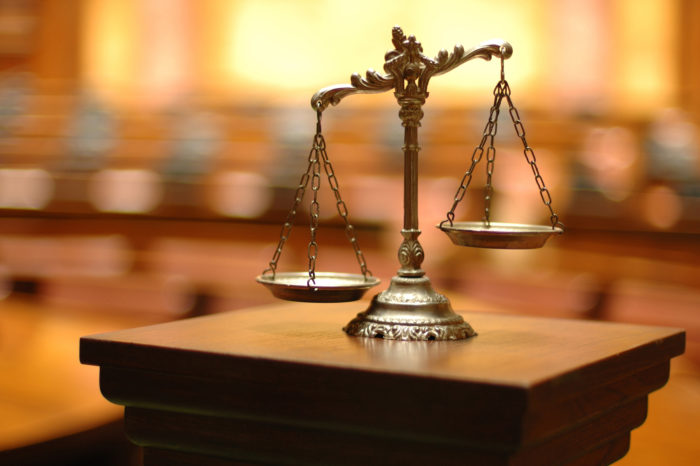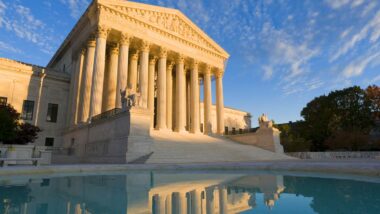Top Class Actions’s website and social media posts use affiliate links. If you make a purchase using such links, we may receive a commission, but it will not result in any additional charges to you. Please review our Affiliate Link Disclosure for more information.
As the coronavirus spreads across the United States, many courts are shutting down – placing court proceedings on hold until further notice.
It’s unclear how long these closures will last for, but criminal and civil actions making their way through court will likely be delayed or scheduled court dates will be rescheduled. Top Class Actions readers can consult the sidebar on this article for more information about specific court closures.
“Coronavirus” refers to a large family of viruses which cause respiratory illnesses in people. Previous outbreaks such as MERS and SARS were both part of the coronavirus family.
The novel coronavirus, or COVID-19, was first detected in Wuhan, China in late 2019. Since then, the virus has quickly spread around the world – including the United States.
How has the coronavirus impacted you? Get legal help by clicking here.
For the most part, symptoms of the coronavirus mirror those associated with the flu including fever, cough, shortness of breath, and more.
However, older adults and people with certain health conditions may be at risk of developing serious, life-threatening complications, such as sepsis and acute respiratory distress syndrome.
The fast spread and concerning death rate of COVID-19 prompted the International Health Regulations Emergency Committee of the World Health Organization (WHO) to declare the outbreak a “public health emergency of international concern,” in late January.
In addition to a stock market crash and widespread cancellation of events such as professional and college sports, COVID-19 has resulted in mass closures of court systems all over the country.
“Public spaces in courthouses tend to be small, tightly packed bench seats that provide the type of situations public health officials have encouraged people to avoid during the COVID-19 outbreak,” Chief Justice Jeff Bivins noted in a statement, according to the Lexington Herald Leader.
In light of these risks, some courthouses have been completely closed. Other courts have opted to instead delay trials or excuse jurors who are over the age of 60 – a group of people who are at a higher risk for developing coronavirus complications.

Although these measures allowed jurors to hear evidence regarding a homeless woman who allegedly set another person on fire, these measures may not be applicable in all situations.
For example, in Michigan, representatives from state courts are recommending that all civil and criminal trials be halted unless a defendant is already in custody. Additionally, the state courts recommend that hearings including at-risk individuals be paused.
Courts in Connecticut and Massachusetts have opted to postpone all jury trials until mid or late April as a precaution. Florida recently suspended most face-to-face legal proceedings in light of a statewide order. Federal courts in regions with significant outbreaks, including places such as Kirkland, Wash., have decided to completely halt all trials and grand jury proceedings.
According to CNN, Chief Judge Ricardo Martinez for the Western District of Washington notes that the court’s public operations are being placed on hold “given the significant number of identified and projected cases of Covid-19 in this District and the severity of risk posed to the public, and given the above public health recommendations from local public health authorities.”
Although many acknowledge that cancelled events and social distancing are a vital part of “flattening the curve,” others argue that keeping the court systems functional is also important.
“You can’t just shut down the public safety function in a crisis,” Michele Hanisee, president of the union representing Los Angeles County deputy district attorneys union, told the Los Angeles Times. “We cannot deprive those accused of a crime their due process rights. The courts have to keep working.”
How Are Normal Consumers Affected By The Coronavirus Closures?
If you are a plaintiff or defendant in a pending civil or criminal action, you will likely be immediately affected by the coronavirus court closures. However, these delays could affect normal consumers as well.
Class Members in class action settlements could be forced to wait a significant amount of time for any compensation. Final approval hearings, which authorize a settlement and allow payments to move forward, may be delayed in light of court closures. This means that, although Class Members may have submitted valid claims for compensation under a settlement, they will have to wait even longer to receive any payments.
Top Class Actions will continue to update readers about closures and rescheduled hearings as the situation develops.
ATTORNEY ADVERTISING
Top Class Actions is a Proud Member of the American Bar Association
LEGAL INFORMATION IS NOT LEGAL ADVICE
Top Class Actions Legal Statement
©2008 – 2024 Top Class Actions® LLC
Various Trademarks held by their respective owners
This website is not intended for viewing or usage by European Union citizens.
Coronavirus Court Closures
U.S. Supreme Court – The court is closed for tourists indefinitely. Writ of certiorari deadlines due on or after March 19 is extended by 150 days from the date of lower court judgement.
Federal Circuit Court of Appeals – Until further notice, in-person arguments are suspended. Unless otherwise noted by court staff, the public is prohibited from entering the National Courts Building.
D.C. Court of Appeals – all oral arguments have been canceled until further notice. Courthouse use is limited to those with official court business, judges, staff and media. Those entering the courthouse must wear a mask.
First Circuit Court of Appeals – all oral arguments occurring in April have been canceled. Live audio feeds of arguments will be available on Fox News, the network pool chair, as well as C-SPAN and the Associated Press. The clerk’s office is not accepting in-person case filings, and appendices will be filed electronically.
Second Circuit Court of Appeals – deadlines and filing dates scheduled between March 16 and May 17 are postponed by 21 days. Only those with official court business may enter the court. Anyone set to argue before the court must inform the clerk if they’ve recently visited China, Iran, Italy, Japan or South Korea or if they’ve been in contact with someone who has. Arguments may be remote if possible.
Third Circuit Court of Appeals – scheduled oral arguments will continue, however, parties can request audio conferences. The Third Circuit Judicial Conference in Philadelphia is canceled between May 13-15.
Fourth Circuit Court of Appeals – The Powell Courthouse in Richmond, Virginia, is closed. The requirement for published opinions is temporarily suspended.
Fifth Circuit Court of Appeals – deadlines to file paper copies have been postponed until further notice. Extensions with justification are permitted at the clerk’s office. Oral arguments will be held remotely if possible.
Sixth Circuit Court of Appeals – People diagnosed with the coronavirus are not allowed to enter any courtroom, and those who have had contact with someone who has the virus are also barred. In addition, individuals who have recently visited Italy, Iran, China or South Korea or have been in contact with someone who has are also prohibited. Oral arguments are allowed to be held via video conference.
Seventh Circuit Court of Appeals – Chicago’s courtroom is closed to the public. Oral arguments scheduled through June 30 will be held via phone conferencing. Arguments are set to be recorded and posted on the court’s website.
Eighth Circuit Court of Appeals – the public is prohibited from entering the Eighth Circuit Clerk’s Office. Parties wishing to file court documents at the Burger Courthouse in St. Paul, Minnesota or the Eagleton Courthouse in St. Louis can leave documents at the office’s front door. Oral arguments are being conducted remotely for certain circumstances.
Ninth Circuit Court of Appeals – the public is prohibited during non-court weeks. Cases scheduled for March, April and May will be evaluated individually to decide if they should be postponed or heard via telephone or video. Arguments will be available through the public through livestream.
Tenth Circuit Court of Appeals – the public is prohibited indefinitely. Denver’s courthouse will only allow judges, staff, security officers and those with official court business. Court filings must be done electronically or by mail. On July 1, the court will reportedly be open to the general public.
Eleventh Circuit Court of Appeals – only judges, staff, media and visitors with official court business are allowed to enter. Paper filing requirements are being waved for the time being.
FEDERAL DISTRICT COURTS AND STATE COURTS:
Alabama – the Northern District of Alabama is not allowing anyone into the courthouses if they’ve tested positive for the coronavirus or have been exposed to it. Most cases will be held remotely.
The Middle District of Alabama is conducting arraignment and detention hearings and initial appearances remotely.
The Montgomery, Dothan and Opelika courthouses has restricted access to those with official court business , as well as judges, court staff, and media members.
The Southern District of Alabama is requiring anyone who enters the courtroom to wear a mask. As of May 18, anyone who enters the premises is subjected to COVID-19 screening.
Alabama state courts have postponed jury trials until Sept. 14. Jury trials that were previously being held as of March 13 will continue. At the discretion of the Circuit judge, District, Juvenile, Municipal and Probate are permitted to begin after May 15.
Alaska – all criminal and civil jury trials set to begin on or before Aug. 3 will be rescheduled. No in-person bankruptcy hearings will occur on or before this date as well. Pretrial deadlines remain in effect.
In the state court system, jury trials are canceled until at least Sept. 1.
Arizona – all criminal and civil jury trials set to begin on or before June 1 will be rescheduled. Grand juries scheduled to begin on or before June 1 have been postponed. Those who recently traveled from an area with COVID-19 and those experiencing virus symptoms are not allowed in the courthouse.
Flagstaff Courthouse is closed to the public until June 30, at least. Only necessary court matters will occur. A maximum of two people are allowed in the court’s seating area.
The state court system has suspended new petit juries through June 1.
Arkansas – the Eastern District of Arkansas has canceled all civil and criminal trials occurring before May 29. Grand jury proceedings will be rescheduled.
The Western District of Arkansas will reschedule all jury trials, civil and criminal bench trials after Aug. 3. Civil and criminal proceedings that do not require an oral argument or can be conducted remotely will continue. Grand jury proceedings are being postponed until July 30 or later.
The state court is sending out jury summonses that begin after July 1. Civil jury trials may be conducted remotely. Criminal jury trials will be conducted in-person.
California – the Central District of California is beginning to implement a reopening plan. The district courthouse is only is closed to the public, with the exception of a few criminal matters. Certain criminal proceedings are occuring in-person when the defendant is out of custody.
The Eastern District of California is closed to the public. Only people with official court business are permitted on the court premises. Criminal matters are being postponed or held remotely by the discretion of the judge.
The Northern District of California is not conducting new civil jury trials before Sept. 30. New criminal juries will not occur before June 30. As of July 1, a small amount of criminal jury trials are allowed. Civil matters are occurring remotely or on paper if possible.
The Southern District of California is permitting certain in-person criminal proceedings beginning June 1. Judges are now permitted to conduct proceedings for all civil cases, excluding jury trials.
The California Supreme Court is rescheduling all in-person oral arguments. Counsel is only appearing remotely.
In the state court system, face masks are mandatory for all Los Angeles County Superior Court judges. Though the court reopened June 15, the clerk’s office and self-help centers are available by appointment only.
Orange County Superior Court is closed to the public, with the exception of matters that are time sensitive or emergency matters pertaining to safety. Services are subject to change if there is a rise of COVID-19 cases.
Contra Costa County Superior Court reopened to the public on May 26. Emergency rules must be followed and are listed on the court’s website.
San Bernardino County Superior Court has begun to reopen with modified service hours depending on the courthouse. Social distancing and face masks are required when entering the court.
San Diego Superior Court is open for “most business operations,” according to their website. Video and telephone conferences are the only way court hearings are occurring. San Francisco Superior Court – new civil jury trials have been postponed for 90 days from their previous scheduled date. Trials already in progress will continue.
Ventura County Superior Court is allowing restricted public access to the courthouse.
Colorado – criminal and civil jury trials and jury selections set to start before July 31 are postponed. Beginning June 22, people entering the courthouse are required to wear a face mask. Naturalization ceremonies are allowed after June 19 as long as social distancing measures are followed.
Colorado state courts are postponing all jury calls through July 19, unless otherwise noted by a chief judge.
Connecticut – criminal and civil jury trials and jury selections that were set to start before June 15 will be rescheduled. Visitors who have been to China, South Korea, Japan, Italy, or Iran in the past two weeks are prohibited from entering the courthouse. In addition, individuals who have visited New Rochelle, N.Y. (unless in a train or car) are not allowed to visit probation offices or courthouses.
Connecticut state courts are also postponing all criminal and civil jury trials. Appellate Court has remote arguments scheduled in July.
Connecticut Supreme Court is rescheduling oral arguments throughout April. As of March 13, appellate pre-argument conferences will not be held for 30 days.
Delaware – J. Caleb Boggs U.S. Courthouse and Federal Building in Wilmington are both closed to the public. Jury trials for criminal and civil jury trials are being postponed if previously scheduled before July 31. As of May 27, impaneled grand juries are allowed to meet.
Delaware Bankruptcy Court is conducting all hearings remotely until July 1.
Delaware Supreme Court is cancelling all in-person hearings through May.
Delaware state courts have implemented a soft opening plan for courts. Attorneys and other court personnel are being permitted into court buildings, with screenings, face masks and social distancing procedures in place. The amount of courthouse visitors must be 25% of the building’s occupancy. In the Dover courthouse, Supreme Court oral arguments are permitted.
Florida – the Florida Southern District Court is suspending all jury trials from March 16 to July 6. Grand juries are canceled until July 6. Grand juries are postponed until Oct 13. Naturalization ceremonies are also suspended until Oct 13.
The Northern District of Florida closed courts to the public to everyone, except those with official court business. Naturalization ceremonies are canceled indefinitely.
Security officers are screening individuals before entering the courthouse and won’t allow anyone to enter if they have visited Italy, Iran, South Korea or China recently. Individuals who had contact with someone who has visited those countries or been diagnosed with the coronavirus are also prohibited from entering district courts. State courts will take precautions and try to conduct business remotely.
The Middle District of Florida is prohibiting anyone with coronavirus symptoms from entering any courthouse. Orlando Division jury trials are postponed if they are set to begin before Aug 31. Trial specific deadlines are also scheduled to begin before Aug 31.
Florida state courts started suspending in-person legal proceedings until July 26. The state courts are preparing for Phase 2 of a reopening, which will allow limited in-person contact.
Georgia – the Northern District of Georgia isn’t allowing the public to enter its courthouse if they have visited China, South Korea, Japan, Italy or Iran in the past two weeks. In addition, individuals who have had contact with someone diagnosed with the coronavirus are prohibited. Civil and criminal jury trials are being postponed until through July 3.
The Middle District of Georgia is canceling jury trials for 60 days. People with coronavirus symptoms are allowed in any courthouse. Most jury trials that were set to begin before July 13 are postponed.
The Southern District of Georgia is only admitting people with official court business into the court. Criminal juries were postponed through May 31.
The Georgia Supreme Court is urging visitors and attorneys not to enter the court if they are showing any virus symptoms or have been exposed to someone who has the flu or COVID-19. In addition, filing deadlines have been posted through May 28.
Guam – the District of Guam is limiting courtroom access. Everyone over the age of two must wear a mask and adhere to social distancing. Court tours, community outreach events and naturalization ceremonies scheduled through July are canceled unless otherwise noted by the court.
Hawaii – the District of Hawaii is prohibiting courthouse visitors who have been in China, Iran, Italy, Japan and South Korea in the last two weeks. In addition, individuals who have had contact with someone who has been in those countries or have the coronavirus are prohibited. Inessential criminal matters are being delayed through June 15. Civil and criminal trials up to May 3 are postponed. On Aug 3., certain trials will resume.
Hawaii state courts postponed grand jury proceedings until after Aug 31. On Sept. 1, circuit courts may resume jury trials, with social distancing measures enforced.
Idaho – bankruptcy or civil proceedings will not take place indefinitely. Preliminary felony and post-conviction proceedings are being held remotely.
In the state court, jury trials are being postponed until Aug. 3. Civil case jury trials will not occur until Oct. 5. Most proceedings are occuring remotely.
Illinois – the Northern District of Illinois will not conduct civil and criminal jury trials before Aug. 3.
The Central District of Illinois will reschedule civil and criminal criminal jury trials as well as petty offense proceedings that were scheduled before July 17. Civil hearings will be conducted via telephone and video conference.
Cook County Circuit Court is stopping all criminal and civil jury trials 3o days from the original date. Essential criminal matters, temporary custody hearings and mental health hearings will continue. Emergency civil hearings will be conducted remotely or in the courthouse.
In the Southern District of Illinois, East St. Louis and Benton courthouses are closed through July 5, with certain exceptions. When inside the courthouse, face masks are permitted. Civil and criminal jury trials will not occur before Aug. 1.
The Cook County Circuit Court is postponing all civil matters occurring in-person for 30 days. Emergency civil hearings will occur in person or remotely.
Indiana – the Southern District of Indiana postponed all jury trials through July 6. Civil court hearings will continue, but may be done remotely.
As of March 18, the Indianapolis Division, Terre Haute Division and New Albany Division have denied public access.
The Northern District of Indiana prohibits the public from visiting the Fort Wayne, Hammond, Lafayette and South Bend divisions. The public also does not have access to the district’s bankruptcy court and probation office.
The Indiana Supreme Court has suspended in-person filing until further notice. If deadlines for filing can’t be made, parties can file a motion for an extension.
Iowa – the Northern District of Iowa prohibits anyone who has been exposed to, or who has had the coronavirus, to not enter the court. Civil and criminal matters will be postponed until through May 11 or later. As of June 1, jury trials are permitted.
The Iowa Supreme Court is not allowing anyone with an increased risk of transmitting the coronavirus into the court. This includes attorneys, jurors, clients and witnesses.
The Southern District of Iowa has postponed civil and criminal jury trials from June 29 to Aug. 1o.
In state courts, criminal non-jury proceedings began June 1. Civil proceedings shortly followed on June 15. Criminal jury proceedings will resume July 13 and civil jury proceedings will start back up Aug. 3.
Kansas – the District of Kansas has postponed non-emergency hearings indefinitely. Jury proceedings will be postponed for 30 days.
In the state court system, civil and criminal jury trials scheduled on or before March 18 will be rescheduled. Trials in progress as of March 18 will continue if the judge sees fit.
Kentucky – the Eastern District of Kentucky will postpone all civil and criminal trials scheduled before May 17. Grand jury proceedings are occurring as usual.
The Western District is postponing civil and criminal trials scheduled through July 10. Civil and criminal cases are permitted to take place in person starting July 15.
The state court jury trials are cancelled through at least Aug.1. As of June 1, grand jury trials are allowed.
Louisiana – the Eastern District of Louisiana has postponed all civil and criminal bench trials until Aug 1. Civil and criminal hearings are also postponed until Aug 1.
The Middle District of Louisiana has postponed all civil and criminal trials until June 30. Hearings scheduled before that time are postponed and will be rescheduled by the assigned judge.
The Western District of Louisiana plans to reschedule all jury trials that begin before Sept. 14. Grand juries will continue and judges are permitted to conduct hearings, but are encouraged to do so remotely. Events that aren’t case related until May 1 are canceled.
Additionally, the public no longer has access to Louisiana Western District Clerk of Court Offices in the Alexandria, Lafayette, Lake Charles, Monroe and Shreveport divisions. For those who wish to submit court filings, the document can be stamped and submitted to the drop box at the appropriate division.
State courts are permitting all matters to be conducted in person. Social distancing must be practiced and building capacities have been limited to 50%. When possible, remote matters are favorable.
Maine – the District of Maine has postponed all grand jury proceedings. The clerk’s office is open by appointment only, and a judge must approve of any public access to scheduled hearings. Court proceedings are limited to issuing search warrant issues, emergency relief motions and other urgent matters.
The courts will schedule certain proceedings such as custody and child protection hearings. Other matters will not be rescheduled or conducted until Sept. 7, or later. All cases previously scheduled are postponed as well.
Maryland – the District of Maryland will allow certain civil jury trials to begin before July 1. Certain criminal jury trials will take place after Aug. 1. Unless considered unfit by a presiding judge, other proceedings will continue as scheduled.
When entering any district courthouse, wearing a face mask is mandatory. If filings are 15 pages or more, the requirement to deliver paper courtesy copies to the clerk’s office has been suspended.
In the state court system, the clerk’s Circuit and District courts offices are still closed to the public. There are few exceptions.
Massachusetts – the Massachusetts District Court reports that courthouses in Boston, Worcester and Springfield remain open. However, jury trials beginning before Sept. 8 are suspended until further notice. Criminal cases, grand juries, the clerk’s office, bankruptcy court and the probation agency will remain open. Those who recently traveled to China, Italy, Japan, Iran and South Korea aren’t allowed in any courthouse, along with those who have been diagnosed with the coronavirus.
Criminal proceedings and pretrial deadlines are postponed by 60 days. Grand jury proceedings will not occur until April 27.
In the state court system, only emergency matters will be conducted in the courthouses, with civil and criminal jury trials that were scheduled before April 17 being postponed until at least July 13. Civil bench trials will continue if they can be handled remotely.
The state appeals court will conduct oral arguments via phone.
Michigan – the Eastern District of Michigan will not host criminal jury trials until at least Aug. 1.
On March 25, a security officer tested positive for the coronavirus at the Theodore Levin U.S. Courthouse in Detroit. The courthouse is closed to the public until further notice. On March 27, the court announced that a total of 10 court security officers showed COVID-19 symptoms. Four were hospitalized and two tested positive for the virus.
The Western District plans to hold as many proceedings as possible remotely. Facilities are closed to the public until April 30 or later. The Ford Building in Grand Rapids and the Marquette Facility are open by appointment only.
In the state court system, trial courts are reportedly allowing only ten people in the courtroom at a time, staff included. Social distancing is required.
Minnesota – the District of Minnesota permits civil and criminal jury trials to resume. Limited, in-person criminal proceedings will be conducted, however, proceedings will also occur remotely. The clerk’s office intake desk is open but not accepting cash payments.
In the state court system, there is at least one public service counter in every District Court in every county. No jury trials will be held in civil cases before Sept. 1.
Mississippi – the Northern District of Mississippi will hold remote proceedings when feasible. Misdemeanors scheduled for April and May are scheduled to be continued through June and July.
In the Southern District of Mississippi, all nonessential matters set through July 31 are postponed indefinitely.
In the state courts system, counties that have had two or less COVID-19 related deaths are permitted to send out jury summons. Remote meetings are still being encouraged.
Missouri – the Eastern District of Missouri will allow a small amount of jury trials in the Southeastern Division beginning July 6. When possible, hearings will be held remotely.
The Western District of Missouri postponed all non-emergency trials through July 6. Bankruptcy courts are currently open to the public from 10 a.m. to 2 p.m. Face masks are required inside the building.
The state court system is limiting court activities that occur in-person.
Montana – the District of Montana will reset all jury trials beginning on or before May 29. Individual judges can choose to hold non-trial proceedings in-person or remotely. Creditors meetings in bankruptcy court will be halted until April 16 or later. Section 341 meetings will be conducted remotely when possible, or postponed.
In the state court system, certain court procedures are occurring with social distance measures in place.
Nebraska – the District of Nebraska has postponed all jury trials until further notice and all grand jury proceedings that were set to begin in March. The court is not allowing in-person court proceedings for those who have recently visited China, South Korea, Japan, Italy or Iran. Nebraska is also restricting those who have been in close contact with someone who has visited those countries to enter the courthouse. Civil and criminal matters are postponed through Sept. 24.
In the state court system, attorneys and parties are required to let the court know if they believe they have been exposed to the coronavirus. Those who do not have symptoms or do not believe they have been exposed to the virus are permitted to attend court proceedings without prior authorization.
Nevada – the District of Nevada halted all trials until March 20. The court will attempt remote hearings whenever possible. Filing deadlines are still in effect, however, the clerk’s office is closed to the public.
The bankruptcy court will hold all hearings remotely.
In the state court system, oral arguments in the appellate courts are postponed indefinitely.
New Hampshire – the New Hampshire District Court will postpone all civil and criminal jury trials dating before Aug. 1. Court sessions will be held at Rudman Courthouse in Concord on Tuesdays and Thursdays. Restrictions for the amount of people in the courtroom will be enforced. Criminal hearings scheduled before April 13 are cancelled.
On Tuesdays and Thursdays, in-person hearings will be conducted at the Rudman Courthouse. There will be restrictions as to the number of people allowed in the courtroom.
In the state court, the Superior Court is conducting all bench trials remotely. Following July 27 or the last day of a declared state of emergency, the Supreme Court is open on a limited basis. Circuit Courts are also open on a restricted basis following July 27, or the last day of a declared state of emergency.
New Jersey – Civil and criminal trials beginning before Aug. 31 are canceled. The New Jersey District Court is not allowing anyone into the courthouses who have been diagnosed with coronavirus or who have been in contact with someone who has travelled to China, South Korea, Japan, Italy or Iran int he past two weeks. Civil and criminal jury trials scheduled to begin before May 31 will be postponed until further notice.
New Jersey state courts are postponing all new jury trials. No Municipal Court, Superior Court and Tax Court proceedings are being held if they are not an emergency matter.
Nonjury proceedings are staggered to promote social distancing. Out-of-state travel has been suspended for staffers. Nonessential court events are cancelled until further notice.
New Mexico – the District of New Mexico has postponed criminal and civil jury trials that were schedule on or before July 31. Grand jury proceedings are permitted by the choice of the district’s U.S. attorney. Face masks are required inside the courthouse.
In the state court, courtrooms will not allow more than 15 people together at a time. Civil and criminal proceedings are conducted remotely with the exception of emergency matters.
New York– the Eastern District of New York is postponing civil and criminal trials scheduled to begin before Sept. 14.
The Southern District of New York reopened for those with official business.
The Northern District of New York postponed all criminal and civil juries and trials that were set to occur Aug. 10 or earlier.
The Western District of New York postponed civil and criminal juries until July 16.
In the New York bankruptcy court, bankruptcy hearings and conferences will all be conducted via telephone for the courthouses of the Manhattan Division, White Plains Division and Poughkeepsie Division.
In state courts, civil and criminal jury trials are suspended. On March 25, the New York City Criminal Court started holding conferences via video. On March 26, the New York City Family Court began hosting remote meetings. Governor Andrew Cuomo created an executive order tolling all deadlines on or before April 19. State courts are also postponing all new trials and restricting individuals who have recently traveled to China, South Korea, Japan, Italy or Iran from entering any of its 350 courthouses. In addition, New York state courts are also restricting those who have been in close contact with someone who has visited those countries or have been diagnosed with the coronavirus.
All state courts are allowing electronic filings. Judges and certified staff have returned to their courthouses, which has resulted in an increase of virtual court rooms for Family court. Grand juries are set to continue beginning Aug. 1o.
North Carolina – the Eastern District of North Carolina is conducting certain proceedings remotely.
The Middle District of North Carolina postponed civil and criminal trials scheduled to begin before Aug. 3. Judges are allowed to conduct certain matters in court. As of June 8, grand jury proceedings are taking place. Face masks are mandatory when entering the courthouse.
The Western District of North Carolina plans to spread out hearings in the largest courtrooms available. Non-evidentiary hearings will be conducted remotely when feasible.
The state court system will not be conducting jury trials until after July 31. The deadline to file a notice of appeal is extended to June 30 for those who had a deadline between March 13 and June 1.
North Dakota – the District of North Dakota has postponed all jury trials starting before July 31. Face masks are required in federal courthouses.
The North Dakota Supreme Court stopped state jury trials until July 1 or later. Nonjury proceedings are being scheduled when possible.
Northern Mariana Islands – the District of the Northern Mariana Islands postponed all civil and criminal jury selections and trials indefinitely. Grand jury proceedings are postponed unless otherwise notified by a chief judge. All non-case proceedings are also postponed.
Ohio – the Southern District of Ohio will hold certain in-court proceedings. Courthouses in Columbus, Cincinnati and Dayton are open. Grand jury proceedings are permitted and Columbus, Cincinnati and Dayton courthouses are open for public access. Masks are required to enter the court house, and visitors are subject to temperature screenings.
In the Northern District of Ohio, courthouses are closed to the public through July 31. Criminal and criminal jury trials will begin in August, the earliest. If in-person meetings are deemed necessary, social distancing measures will be enforced and limited to 10 people. Electronic or mail filings can be made through the clerk’s office.
The Ohio Supreme Court is conducting video conferencing and other remote hearing techniques when possible. Pretrial hearings apperances have been waived.
Oklahoma – in the Northern District of Oklahoma, civil and criminal matters that are not held remotely will be postponed. Grand juries are postponed as well. Civil and criminal motions that do not require an oral argument are set to continue.
The Western District of Oklahoma will postpone April grand jury trials. Civil hearings and criminal proceedings will mainly be held remotely. Three grand jury sessions for April and March have reportedly been canceled. A naturalization ceremony for June 26 has been canceled. Cloth face coverings are mandatory for courthouse visitors.
The Eastern District of Oklahoma is cancelling all jury sessions through Aug. 3, at the Ed Edmondson Federal Courthouse in Muskogee. A grand jury trial is taking place on June 9, but with social distancing requirements in place.
The Oklahoma Supreme Court and Court of Criminal Appeals is requiring civil and criminal jury trials to be rescheduled after July 31.
Oregon – the District of Oregon postponed civil and criminal jury trials scheduled through July 16. Civil and criminal matters will be rescheduled as well, unless it can be conducted remotely. The District’s Clerk Office is closed to the public and only accessible through phone.
The state court system trials and hearings scheduled will be rescheduled for after June 1. There are limited exceptions. Trial courts are reportedly decreasing the amount of jurors summoned. Potential jurors who are high risk for for severe illness can reschedule their service by calling the court house. In areas where the governor permits 50 0r more people in one place, courts are allowed to host jury trials starting July 1.
Pennsylvania – the Eastern District of Pennsylvania is postponing all civil and criminal jury trials until Aug. 31.
The Western District of Pennsylvania is postponing all civil and criminal jury trials and grand jury selections until Sept. 8.
The Middle District of Pennsylvania is postponing all civil and criminal proceedings for 60 days (as of March 13). There are some exceptions for individual cases.
In Pennsylvania state courts, jury trials are postponed until further notice.
In the Philadelphia County Court of Common Pleas, all jury trials are cancelled through Sept. 8. The Municpal Court – Traffic Division is open for limited time for certain purposes, including impoundment hearings, appeals and cash payments.
In Allegheny County Court of Common Pleas, public entrance is limited to Judges, authorized court personnel, and others with official court business. Face masks are required.
In Montgomery County Court of Common Pleas, jury trials scheduled through March 27 have been canceled.
Puerto Rico – the District of Puerto Rico is conducting various proceedings remotely. At the Clemente Ruiz Nazario U.S. Courthouse and the Federico Degetau Federal Office Building in Hato Rey, face masks are mandatory. The bankruptcy court intake area will be closed to the public until Aug. 5.
Rhode Island – in the District of Rhode Island, the One Exchange Terrace, Providence courthouse has been shut down until further notice. The John O. Pastore Building in Providence will be closed Tuesdays and Thursdays and available for limited purposes on Mondays, Wednesdays and Fridays. A case manager will cancel all civil matters occurring in-person and reschedule remote hearings. Unless liberty interests are affected, criminal hearings are postponed. Throughout July, civil and criminal jury selections and trials are postponed.
In the state Superior Court system, certain jury trials are cancelled until after Aug. 1. Emergency and essential matters will continue. Bench trials are postponed until at least July 1. Grand jury proceedings are permitted. Nonemergency proceedings that cannot occur remotely will be following strict social distancing guidelines, with staggered calendars and face mask protocalls.
South Carolina – the District of South Carolina postponed all civil and criminal jury selections scheduled to begin before July 5. Grand jury proceedings are postponed until this date as well, unless otherwise notified by the chief judge. Deadlines for civil cases have been extended by 21 days. Statutes of limitations are not delayed at this time. Unless civil and criminal matters can be conducted remotely, in-court appearances beginning before July 5 are postponed.
In the state court system, oral arguments are cancelled in the appellate court. Emergency hearings are permitted in Circuit Court. As of June 1, county grand jury proceedings are permitted.
South Dakota – the District of South Dakota postponed all criminal and civil trials scheduled to begin on or before July 5. Civil and criminal trials before July 5 are postponed indefinitely if the trial can’t be held remotely.
The South Dakota Supreme Court declared a judicial emergency. Every circuit will enforce policies to prevent people who have the coronavirus and those who are high-risk to be exempt from appearing in court.
Tennessee – the Eastern District of Tennessee will postpone civil and criminal jury trials starting on or before June 14 are postponed. Misdemeanor dockets through May 30 are postponed, as well. Oral proceedings that can be held remotely are encouraged to take place.
The Middle District of Tennessee will reschedule all criminal and civil jury selections that were supposed to take place up until July 31. The court is beginning to implement in-person proceedings in phases. Face masks are required.
The Western District of Tennessee postponed jury trial selections for criminal and civil jury selections that were scheduled before July 31. There are limited grand jury proceedings occuring. In the clerk of court offices in the Eastern and Western divisions, public counters will remain closed.
Tennessee state courts are restricting in-person proceedings until July 3, with exceptions for emergencies. Statutes of limitations, orders of protection and temporary injunctions that originally expired between March 13 and May 31 will be postponed until June 5.
Texas – the Northern District of Texas postponed civil and criminal trials.
The Southern District of Texas is postponing all jury trials until June 30. Civil and criminal jury trials in the Corpus Christi Division have been postponed through Aug. 3. As of July 13, Bob Casey U.S. Courthouse in Houston and the U.S. Post Office and Courthouse in Galveston are open. Jury trials that were scheduled from July 8 until Sept. 8 will be rescheduled by a presiding judge.
In the Eastern District Court, counsel and all parties decided that attorneys and parties must inform the court if they are aware that meeting could cause someone to be be exposed to the coronavirus.
The Western District of Texas is rescheduling civil, criminal bench and jury trials that were supposed to occur before June 30. Grand jury proceedings will continue to take place. Naturalization ceremonies and public tours are cancelled through July 31.
In Texas state courts, all jury trials and large docket calls are postponed until at least Sept 1. Deadlines are pushed until June 1. Not including appellate deadlines, deadlines for civil case filings between March 13 and Aug. 1 are extended to Sept. 15.
U.S. Virgin Islands – all bench trials for civil and criminal cases before July 15 are postponed indefinitely. Sitting grand juries are not aloud to meet before July 15. Those who tested positive for coronavirus, have been exposed to the virus or those displaying symptoms are not allowed in the courthouses.
The Supreme Court of the Virgin Islands plans to resume all in-person matters, with the exception of jury trials, on June 15. Social distancing guidelines will be strictly enforced. With the judge’s discretion, in-person jury trials are permitted on Aug 1.
Utah – the District of Utah will postpone jury meetings as well as civil and criminal jury trials through Aug 1. Criminal cases that were previously scheduled are postponed through Aug 1.
In the state court system, criminal and civil jury trials are suspended indefinitely. Hearings will be conducted remotely. People with coronavirus symptoms or thosw who may have been exposed to the virus may not enter the courthouse. If possible, remote hearings will be conducted. Criminal and civil trials will be rescheduled until after June 1.
Vermont – Anyone in the public spaces of the courthouse are required to wear a face mask. Remote hearings are occurring as often as possible. Unless otherwise specified by a presiding judge, civil and criminal trials will not occur before Sept 1. In-person hearings for criminal and civil cases began in Burlington after May 25 and in Rutland after June 8.
In the state court system, criminal jury trials are postponed until Sept 1. Civil jury trials are postponed until Jan. 1, 2021.
Virginia – the Eastern District of Virginia is rescheduling all civil and criminal proceedings scheduled through June 11. Grand juries are not meeting. On June 11, non-emergency meetings will occur with social distance guidelines in place.
In the Western District of Virginia, grand jury trials scheduled before Aug. 3 are postponed. At the decision of the presiding judge, civil and criminal proceedings are set to proceed on June 29.
In the state court system, statutes of limitation and other case-related deadlines are extended through July 19.Remote arguments will be conducted remotely through June 30 or later. Virginia Supreme Court and Rose Lafoon Building in Richmond are closed to the public until further notice. Everyone that is over the age of 10 is required to wear a face mask when entering the courthouses.
Washington – the Western District of Washington has suspended all grand jury proceedings and criminal and civil cases occurring before Aug 3. For non-jury cases, the court will evaluate on a case-by-case basis.
The Eastern District of Washington vacated civil and criminal cases through July 31. Naturalizations are canceled through June 30, as well. In Spokane, the clerk’s office is open for the public to utilize. In Yakima and Richland, the clerk’s office is open, but the public is not allowed inside. Staff is reportedly available via phone or mail.
In the state court system, nonemergency civil trials and civil and criminal jury trials are suspended until after July 6. Emergency matters will be held remotely if possible.
Washington D.C. – all D.C. courts with civil and criminal jury trials are postponed until at least Aug 1. Other proceedings, such as civil and criminal jury trials will be postponed until July 15. Federal trial and bankruptcy courts will remain open. On Aug. 17, naturalization ceremonies are expected to start up again.
The D.C. Superior Court is conducting most matters remotely. Only four courtrooms are open.
The D.C. Court of Appeals is cancelling oral arguments through May 26. Filing deadlines from March 16 or later are delayed until June 30.
The U.S. Tax Building is closed and many trials from March through April have been canceled.
The Court of Federal Claims is hosting all proceedings scheduled before June 15 will be held remotely, unless a chief judge grants permission for in-person trials.
West Virginia – the Northern District of West Virginia prohibits all people who tested positive for the coronavirus and anyone who may have come in contact with the virus from entering the court. The time period from April 17 through June 30 may be excluded from speedy trials.
The Southern District is following the same procedure and postponed all civil and criminal jury trials, as well as grand jury trials, indefinitely. Grand and petit jury selections and trials may resume, as of July 1. Certain civil and criminal trials may occur with social distance guidelines in place.
In the state court system, proceedings and judicial deadlines scheduled through May 15 are postponed until further notice. Certain emergency matters will continue. Deadlines that were set to expire between March 23 to May 15 will be pushed to May 18. Proceedings involving a grand jury will continue after June 15. Jury trials are permitted to continue on or after June 29.
Wisconsin – the Eastern District of Wisconsin may resume all civil and criminal jury trials starting July 2. Starting the same date, parties seeking exclusions of time under the Speedy Trial Act are required to do so with the presiding judge.
The Western District of Wisconsin plans to keep the Kastenmeier Courthouse in Madison open. Those who feel sick should stay at home. Both civil and criminal hearings will be conducted remotely until June 30, the earliest.
The state court system is postponing all criminal and civil trials until a plan is in place to safely resume in-person court sessions.
Wyoming – the District of Wyoming is conducting all matters remotely, if possible. Those who have tested positive for coronavirus or who have recently visited China, Iran, South Korea and various European countries are forbidden from entering the courthouse. All District and Circuit courts are closed to the public.
In the state court, District and Circuit courts prohibited in-person proceedings until Aug 3. Civil trials will be rescheduled and the courts will attempt to do the same for criminal trials. The Wyoming Supreme Court building located in Cheyenne shut down to the public.
Immigration Courts – The U.S. Department of Justice’s Executive Office for Immigration Review has made the decision to reschedule immigration court hearings for immigrants that are not detained. The postponing for these court hearings will occur through July 17. Hearings for those on the detained docket are continuing.
Three courts in California, Dallas and Kentucky are reportedly closed. Certain courts are partially open for limited reasons, including hearings for detained immigrants and accepting filings. The 22 courts that are open include: Adelanto, California; Aurora, Colorado; Batavia, New York; Fishkill, New York; Ulster, New York, Conroe, Texas; El Paso, Texas; Fort Worth, Texas; Port Isabel, Texas; Elizabeth, New Jersey; Eloy, Arizona; Special Processing Center; Falls Church, Virginia, Immigration Adjudication Center; Florence, Arizona; Honolulu; LaSalle, Louisiana; Miami Krome; Oakdale, Louisiana; Otera, New Mexico; Pearsall, Texas; Stewart, Georgia; Tacoma, Washington; and York, Pennsylvania.














Please add me. I was falsely arrested in April 2020 and not allowed in my own home for 75 days, I couldn’t get a court date until June 21 when I was able to prove I was innocent and the people who accused me of domestic violence were found to have done this same thing 2 times before. They were allowed to stay in my home of 20 years while I paid $70 a day to live in a hotel. I should have been able to get a court date immediately, via Zoom, instead of having to wait 75 days to get justice. I’m steaming mad and should have had my timely due process, especially during Corona.
Please Add me! The court system is the worst now in South Carolina and still uses Coronavirus as an excuse for horrible services to the public.
Please add me, I’m still going through a divorce and my ex cleaned out the accounts and left me with nothing and locked me out of our home. The initial trial the judge took forever to respond with his decision almost 2 months later and he ruled that we both just walk away with what we have but didn’t address a CD where my ex took my inheritance money and placed as collateral for a secured loan. We went back and asked the judge and he said to divide that 50/50. I had $144k of inheritance money in mid July 2017 and now I have nothing? Not to mention we had a paper trail showing I used a large portion to renovate our home which I was denied access to. All of this during a pandemic where finances were affected for so many. I just want some justice and some of my money back. I realize I can’t have all my money but I feel it’s only fair to give me a portion of it bc it’s my money and because it benefited my ex by increasing the value of his home
Please add me. I have had my trial for a law suit that I was injured in postponed two times now. And still do not have a estimated date of trial. This postponment of the trial has been a huge financial hardships on my family as I would have received compensation for my injury. Not going to trial has effected every aspect of my life. As I have been laid off due to covid, the strain of the lack.of a settlement/trial has ended my marriage and has caused severe financial hardship for my family.